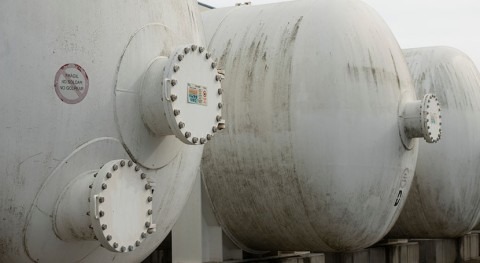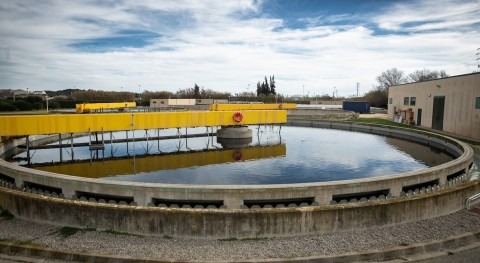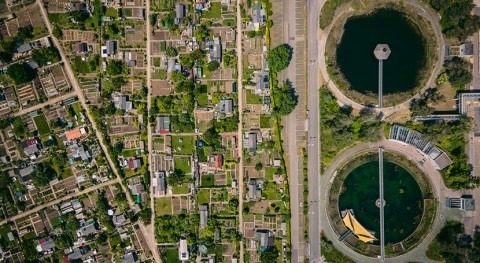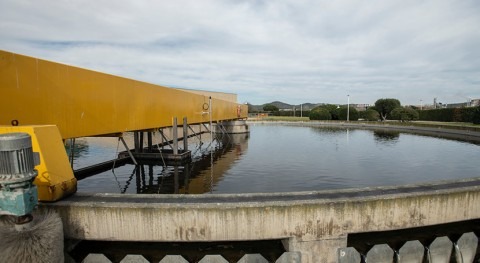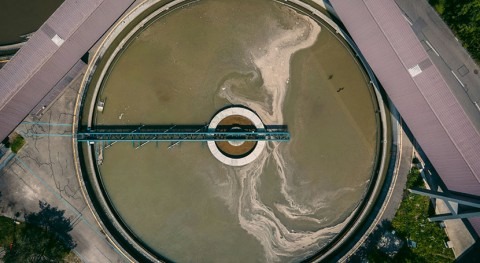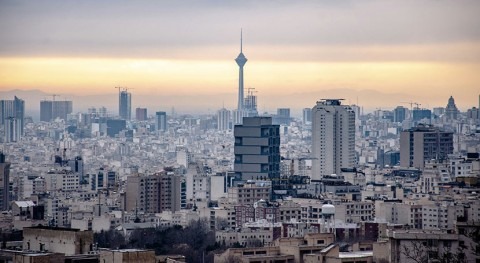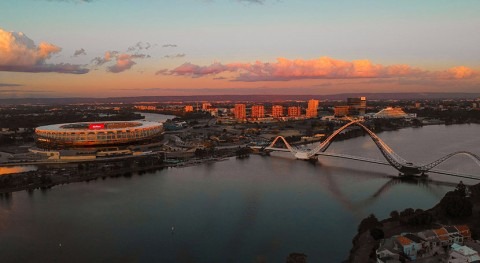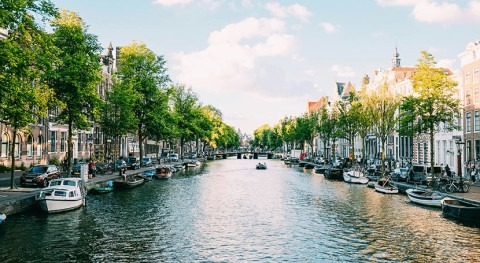With an extensive academic background — he has been a professor of Economic Theory at the University of Alcalá since 1997 — Gonzalo Delacámara's career is a success: he coordinates the Department of Water Economy of the IMDEA Agua Institute in Madrid, and is a consultant for many international organisations, including the European Union, the United Nations, the World Bank, the OECD or the IADB. We can say, without a shadow of a doubt, that Delacámara is a key actor in the development, implementation and monitoring of a good part of the most significant water and natural resource policies across the world.
Established his prestige, in 2016 he embarked upon a new venture: becoming academic director of the Water Economy Forum, a public debate initiative that has drawn the interest of several Nobel laureates and has become consolidated as one of the most valued meeting fora for the water community.
In the past few years we have witnessed how his public presence experienced a meteoric rise. His talent as a speaker (unmatched in the sector), and his elaborate discourse on the current and future challenges of water management and climate change, have made Delacámara a heavyweight sought after by the media and event organisers. And he never disappoints anyone. This interview, where we discuss the situation of urban water services in Spain just before four elections take place (national, local, regional and European polls), is the best example.
Urban water services in Spain

Question: Mr Delacámara, what do you think about the situation of urban water services in Spain?
Answer: It is a good idea to avoid complacent or apocalyptic views regarding public water services in cities. We can say that Spain is a success story. Urban water services use advanced technology and the efforts done in the past decades have led to definite improvements. Non revenue water has decreased by 30% in the past 25 years, from 32% in 1991 to 22% in 2016. Household consumption has decreased by 20% in 10 years, down to an average of 132 litres per person per day in 2016. Needless to say, there is universal access to water services. This is the result of the technological leadership of Spanish companies, recognised worldwide, and the collective action of citizens, public authorities and the private sector. But it does not mean that there are no challenges ahead.
A major challenge is to connect explicitly (through policy design and implementation) the urban water cycle with the challenges at the river basin level. We have to ensure greater water security in the medium and long term, in terms of quantity and quality, in a context of unavoidable adaptation to climate change. We often tend to analyse the urban sector in an isolated manner, as if it was not connected to the land. There is margin for improvement concerning the digitalisation of the economy, where the water services sector is late with regard to improving accountability, ensuring better public control, harmonising regulatory principles and moving forward in social fairness.
There is also margin to improve the efficiency, diversify sources, especially in areas with structural water scarcity, reduce the increasing cost of raw water for providers, refurbish networks and infrastructure, and improve advanced waste water treatment and reclaimed water reuse (an area where Spain is already a leader in the EU). One of the major challenges is to align individual interests (of citizens, authorities or service providers) and collective objectives, guided by the general interest.
It is a good idea to avoid complacent or apocalyptic views regarding public water services in cities
Q: Public investment has decreased substantially in the past decade. What consequences can we expect?
A: There has been a decline in public investment in general, but the provision of water services has been more affected than other areas. The investment level was already low before the last crisis began, and since then a decade has been lost, revealing there has been little interest in these services for years. The latter is more of a concern that the decrease in investment, as difficult as the situation may seem.
We do not have to wait for the consequences, they are already here. Some 39% of the water supply network is more than 30 years old, and only 17% is less than 10 years old. That is not the biggest problem, however, but the fact that the rate of network renovation is 0.6% per year. In 2008, when we usually date the start of the crisis, the rate of renovation was 1.3%. So the problem is a structural one, not a temporary one. The sewerage network is in worse condition: some 58% is more than 30 years old, and the rate of renovation is 0.38% per year.
In Spain, the level of investment in water infrastructure is among the lowest of the European Union, with only Sweden investing less (0.11% of the GDP compared with an average of 0.27% for the EU). That means half of the investment committed by other large EU economies (France, Germany, United Kingdom, Italy, etc.). From 2007 to 2016, Spain's national budget cut back the funds allocated to new water infrastructure by 90% and the allocation to maintaining existing infrastructure by 42%. Public authorities allocate a little over 1.4 billion euros per year to renovation and new developments, whereas service providers (public, private and public-private) commit a similar amount (1.376 billion euros per year).
Overall, the deterioration of assets results in more costly operation and maintenance, drives us further from achieving environmental objectives, increases inefficiency and takes a toll on equity and social and territorial cohesion.

Q: The European Commission is watching Spain closely for failing to comply with Directive 91/271. What do you think are the reasons for, almost 20 years after the deadline, having agglomerations with more than 15,000 inhabitants without waste water treatment?
A: Waste water treatment presents a greater infrastructure deficit, mostly in small and medium sized municipalities. Moreover, the issues do not only concern primary or secondary treatment. In Spain, hardly 40% of the waste water produced undergoes tertiary treatment. Beyond the most obvious costs (environmental deterioration mainly, or the costs of restoring aquatic ecosystems damaged by pollution), there are several lost opportunities related to a circular economy approach (water reuse for different uses, nutrient or energy recovery, etc.)
Some estimates indicate we would need to increase by 25% existing waste water treatment plants. Nevertheless, two other aspects need attention: we need current plants to work well, and we cannot let waste water treatment plants do all the treatment work. Recovering upstream aquatic systems, decreasing polluting economic activities, and reducing pollution pressures are as important as increasing the treatment capacity.
Another issue that remains to be properly addressed and which we should not underestimate is how to pay for waste water treatment activities in the urban water cycle. And also related is how to fund local entities themselves, who are responsible for waste water treatment; their funding models do not always allow covering the costs of operating waste water treatment plants.
Waste water treatment problems are often blamed on the deficiencies of discharge monitoring and the management of sewerage networks, the unsuitable design of plants, ageing plants, etc. All of these are real, but I think we should highlight the role of certain economic activities: nutrients from agriculture, artificial soils due to rampant urbanization, air pollution that has an effect on waste water treatment plants due to unsuitable storm water management, etc.
A major challenge is to ensure greater water security in a context of unavoidable adaptation to climate change
Q: The Water Framework Directive says in Article 9 that Member States shall take account of the principle of recovery of the costs of water services, including environmental and resource costs. Is this principle being applied in Spain? What are the risks of not doing it?
A: The European Commission often points out deficiencies in cost recovery, particularly (although not only) in relation to agriculture. The last report on the implementation of the Water Framework Directive and the Floods Directive published last February indicates that, even though progress has been made, there are shortcomings concerning the rates of recovery of the costs of some users. Providing a general methodology to calculate cost recovery has led to a certain harmonisation, and incorporating certain environmental costs has led, in fact, to increased costs when compared to those of the first planning cycle. However, that progress with regard to methods clashes, in many cases, with effective compliance of cost recovery and polluter pays principles.
We need to have an informed public debate on how to pay for water management and urban cycle management. It would involve, for example, differentiating between economic and financial variables, between the capacity to attract the capital required for investment and adequate funds for the operation and maintenance of any intervention. Cost recovery is a key aspect from an economic point of view, but it is only instrumental. That is, costs are recovered to comply with the objectives of water policy and other policies, and ultimately, to improve citizen's well-being, increasing resilience to extreme events, ensuring greater water security in the medium term, etc. It is imperative we explain this last part to citizens. Otherwise, we cannot expect them to be concerned about the rate of cost recovery.
In Spain, the level of investment in water infrastructure is the lowest of the European Union
Legislative and jurisdictional framework
Q: What is your view of the jurisdictional framework of urban water services in Spain? Is the model too fragmented?
A: It certainly is: 8,125 local jurisdictions, more than 2,700 operating systems; it is highly fragmented. However, this should not lead to removing powers from municipalities. For those of us who believe in the true sense of public (the prevalence of the challenges of water and social policies, of the general interest, regardless of the management model), the truth is that preserving municipal powers and generating incentives for cooperation in the provision of services seems a fairness and efficiency issue.
Less than 9% of those municipalities have a population greater than 10,000. According to a study done by the Demographic Studies Centre (CED) of the Autonomous University of Barcelona, 60% of the municipalities have less than 1,000 inhabitants, occupy 40% of the country's land area and are home to about 3% of the country's population. In fact, 1,840 municipalities are becoming depopulated, a trend hard to revert. Once again, there is a reality that goes beyond the water sector, although the consequences of these demographic and socio-economic processes are key to understand what is happening in the sector.

Q: Different actors are demanding a single, independent and transparent regulatory entity that can establish clear standards for the provision of services. What do you think should be its specific role? Which countries have implemented this model successfully?
A: When we talk about a single regulatory entity, maybe we are putting the cart before the horse. We have defended a single set of regulatory principles. The discussion about a regulatory entity is related to this, but it is different, and in a quasi-federation such as Spain, it is not easy to think about a single regulator. It seems more reasonable to refer to regulatory principles to start with (for example, aimed to harmonise the tariff structure, not to establish price levels centrally), then to the role of one or several regulatory entities, and finally, but only at that point, to the vehicle for regulation itself.
Moreover, what is really important is sharing a roadmap, a vision. Regulatory changes do not occur (and should not occur) overnight. We would hope for regulators to be independent bodies, with regard to their funding, role and decision-making powers. However, regulators based on technical expertise, with limited connection or commitment to public policy, do not necessarily lead to good regulatory results. Regulatory principles have to be closely linked to social, economic and environmental objectives.
Beyond looking after the interests of citizens, regulation must guarantee that operators meet the mandate of competent authorities, contribute to water security as a medium term objective, ensure sustainable funding of the system, include resilience as a core element of water cycle management, and promote efficiency and equity with regard to operator performance, by eliminating asymmetries in the final price of services not related to real costs, and increasing accountability.
Waste water treatment presents a greater infrastructure deficit, mostly in small and medium sized municipalities
Public-private collaboration

Q: You have been very disapproving of the public vs private debate we have witnessed in Spain over the past few years. Do you think it has finally decreased in intensity, or are we only getting a respite given the political situation?
A: In general, I support public debate. However, some debates are formulated in such a way that they hinder moving forward. Whereas the debate is fabricated to a certain degree (although not certain terms of it), I do not feel part of any conflicts, nor part of any side, so I cannot feel if it is intense or if there is a respite. If someone sees me as an advocate of direct management by excluding the private sector, then he/she is wrong. If someone sees me as a staunch advocate of private service providers, he/she is also wrong. I believe that the challenges we face are much greater (climate change, rampant inequality, environmental deterioration, etc.). To address them, I think it is essential to join forces and find cooperative approaches between sectors, municipalities and between government levels.
Q: Earlier on we talked about the investment deficit. In the current fiscal restraint scenario and given the requirement of fulfilling the deficit criteria set by Brussels, what should be the role of public-private collaboration in the construction and management of infrastructure?
A: In some cases, that collaboration will be essential. It has to be guided by the general interest, and for that, having regulatory principles is a must. On the other hand, it is not enough to emphasise certain public-private collaboration contract models. Beyond sophisticated contract types, it is essential to ensure that we generate incentives to invest in the sector, but also to operate infrastructure, and even more importantly, to preserve water sources. And we have to advance regarding governance of water services, not only through meaningful citizen participation, but also through coordination of sector-based policies, generating conditions for technological, financial and social innovation, redesigning incentives to move forward to greater security and adaptability, and addressing shortcomings with regard to jurisdictional issues in some services, etc.
Politics
We need to have an informed public debate on how to pay for water management and urban cycle management
Q: Spain is facing an intense electoral marathon race that will start on April 28 with national polls and will continue in May with local, regional and European polls. What do you think will be the role of water in the political debate?
A: I would like people to appreciate the multiple values of water; to understand the role of water as a limiting factor and as an opportunity for social and economic development; to consider water in national policies; I would like to see competition over who offers the best service to citizens, instead of who offers the lowest tariff, in a manner that ensures affordability and proper public control regardless of the management model. I would to hear discussions about ends and not just means, discussions based on rational criteria and not just value judgements, etc. Then again, based on previous elections, I am afraid that the discussions will be poor, black-and-white, will generate conflict and will avoid the major challenges ahead of us.
Q: Since the last national election in 2016, we have seen two ministers deal with water issues: Isabel García Tejerina and Teresa Ribera. What would you highlight from their performance?
A: In both cases we are talking about people very open to agreement. Nevertheless, their respective ministries have been so different that they are hard to compare. In the case of Ms García Tejerina, my feeling is that her comfort zone was agriculture, and environmental and water management issues were not among her priorities. I would not say that water was the comfort zone of Ms Ribera either, but I think four key decisions were positive: underscoring the importance of transition, that is, a series of policies that have a long term outlook; ensuring decisions related to energy or other areas are subordinate to achieving climate change adaptation and mitigation objectives; making water competences part of a multi-sector ministry, and finally, ensuring water discussions are where they should be: in the context of climate change adaptation, the challenge of our generation.
I would like to see competition over who offers the best service to citizens, instead of who offers the lowest tariff
.jpg)
Q: What would you ask the new administrations for (national, regional and local) concerning water policy? Where is consensus required?
A: It is not always easy to reach consensus in the Spanish political system. In fact, a lot has been done concerning one aspect of our regional state: the decentralisation of powers. Greater self-rule, greater autonomy of local governments, all that is great. However, federal models that work best are those where there is also an emphasis on a second cornerstone: cooperation and search for shared principles. We have not done such a good job at that.
I will focus on one aspect. We stress the need for transparency and accountability of water service providers (public, private, or public-private ones). I agree. But I would say that demand should be reciprocated, and the local administrations elected on May 26th should tell citizens everything they know about the urban water cycle. Lowering tariffs by not including certain costs or decreasing investment, recovering direct management to then put it out for private tender almost entirely, setting a concession fee to then use it for something unrelated to water cycle management, privatisations that are not in the general interest, etc. These may all be legal practices, but they are somewhat of a social fraud.
There has been a decline in public investment in general, but the provision of water services has been more affected than other areas
Q: To end the interview, we would like to ask you about the future of the Water Economy Forum. What activities are planned in the coming months?
A: The forum was born with the idea of not settling for a specific number of activities on fixed dates; instead, we would propose public debates when we think there is enough content of interest. Also, it is a non-profit activity, so there are certain limitations. We started this year with the forum on the circular economy held on March 26th in Granada. Later on, possibly after the summer, we will hold a forum in Madrid, and, after our collaboration with the Fira during the past edition of Iwater, we are exploring the idea of a new forum, part of the Smart City Expo World Congress, to be held in Barcelona from November 19th to 21st, 2019.









